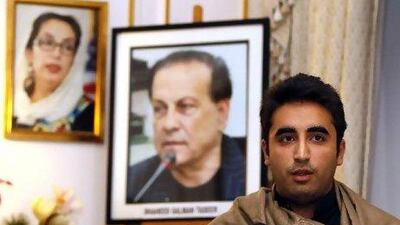ISLAMABAD // The son of the assassinated Pakistani leader Benazir Bhutto has emerged as a formidable opponent to the religious fundamentalists opposed to the reform of a tainted blasphemy law.
Bilawal Bhutto shares the chairmanship of the ruling Pakistan People's Party (PPP) with his father, Asif Ali Zardari, the Pakistani president, but has largely stayed out of the political spotlight to pursue a degree at Oxford University.
He unexpectedly took centre stage on Monday at a memorial service in London for Salman Taseer, the governor of Punjab, murdered in Islamabad last week by his police bodyguard after calling for reforms to the blasphemy law.
An alliance of religious parties, clerics and militants has since portrayed the assassin, Malik Mumtaz Qadri, as a hero for supposedly defending the honour of the Prophet Mohammed against Taseer, whom they had branded an apostate.
Speaking in a forceful style reminiscent of his late mother, Mr Bhutto challenged the fundamentalists, comparing their justification of Taseer's murder on religious grounds with suicide bombings.
"To those who are praising or justifying these crimes, I say: you, along with the killers of shaheed [martyr] Salman Taseer are the real blasphemers," he said.
His use of the title "shaheed" was pointed.
Previously, it was reserved by the PPP for the party's founder, Zulfiqar Ali Bhutto, hanged on the orders of a court in 1979, and Benazir Bhutto, his mother, who was gunned down in December 2007.
He vowed to defend Pakistani Christians and other minorities, saying: "Those who wish to harm you for a crime you did not commit will have to go through me first."
He spoke a day after an estimated 50,000 religious activists gathered at a rally in Karachi, many of them waving posters of Taseer's assassin.
The rally was the biggest showing by Pakistan's religious right since 1977, when fundamentalist parties spearheaded protests that brought down the government of Zulfiqar Bhutto.
In their speeches, religious party chiefs claimed Taseer was to blame for his own murder because he had offended Muslim sentiment by calling the blasphemy law a "black law" - a term used by the PPP to describe oppressive laws introduced by Gen Mohammed Zia-ul-Haq, who overthrew Bhutto and had him executed.
The blasphemy law was originally enacted in 1927 by the British colonial government to discourage communal violence and it defined blasphemy as "derogation of all religions". The section introduced by Gen Zia reinterpreted blasphemy as "remarks derogatory to the Prophet Mohammed and Islam".
In 1991, the federal shariat court ruled the death sentence was mandatory in blasphemy convictions.
While no death sentences have been carried out, people accused of blasphemy are forced to abandon their lives and flee to avoid being murdered.
At the Karachi rally, some politicians demanded that Yousaf Raza Gilani, the prime minister, declare in parliament that the government would not attempt to amend the blasphemy law, and threatened to march on parliament if he did not capitulate.
Their bellicosity was tinged with threats against PPP activists and civil libertarians who have publicly mourned Taseer's death.
On Friday, a cleric at a mosque in Karachi's Defence Housing Authority suburb issued a fatwa, or religious edict, declaring Sherry Rehman, a PPP member of parliament, an apostate.
Ms Rehman tabled a parliamentary bill in November proposing amendments to the blasphemy law. "The dark forces of violent extremism, intolerance and bigotry are intent on devouring our country and our faith," Bilawal Bhutto told mourners in London.
"I will not be silenced by fear."
His speech was clearly intended, analysts said, as a rallying cry for his party's activists and other moderate Pakistanis, many of whom have been cowed by the intensity of the fundamentalist campaign.
"Despite all their mistakes, the Bhuttos and the PPP have survived politically because they represented the oppressed, and did not hesitate to make sacrifices when required," said Suhail Warraich, the political editor of Geo, Pakistan's most popular cable news channel. "The minorities are loyal voters for the PPP and swing the results in many constituencies in its favour. Bilawal had to speak up for them."
The PPP, like other mainstream political parties, has agreed that the blasphemy law is widely abused, misinterprets Sharia and needs reform.
However, the government desperately wants to avoid a confrontation with the political clergy, whose theological support has been key to turning public opinion against the insurgency launched by Tehrik-i-Taliban Pakistan militants in 2007. Taseer's murder has also played second fiddle to the prime minister's preoccupation with retaining his job, which looked in jeopardy after two political parties pulled out of his coalition within a month, depriving the government of its parliamentary majority.
The prospect of a no-confidence motion against Mr Gilani was averted last Friday when the Muttahida Qaumi Movement rejoined the government.
The other party, the Jamiat Ulema-i-Islam (JUI), left the government after one of its ministers was sacked in December, and is now at the forefront of the campaign to preserve the blasphemy law.
Bilawal Bhutto has already been nominated as the PPP candidate for prime minister at the next general election, scheduled for not later than January 2013.
With additional reporting by Reuters and Associated Press

